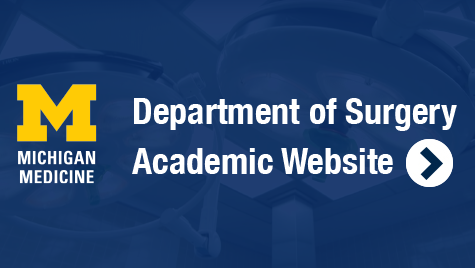The University of Michigan Department of Surgery is home to highly innovative musculoskeletal and regenerative medicine research initiatives. The work of the surgeon-scientists in our Department, which includes one of the largest academic plastic surgery sections in the country, is advancing the field, directly impacting how we take care of our patients. We take pride in developing solutions others may not have considered — or imagined. Whether restoring lost functionality or providing patients capabilities they lacked before, our faculty strive to improve surgical outcomes and patients' quality of life. We work toward that goal through our basic science, translational, clinical and health services research.
Our Musculoskeletal & Regenerative Medicine Research
Find Groups & Investigators in Musculoskeletal & Regenerative Medicine
Discover More Research at the Department of Surgery
Visit our Faculty & Lab Directory for a list of all the centers, programs, labs, and independent investigators in the Department of Surgery.
Themes & Impact
Restoring Touch
Using regenerative medicine strategies at the University of Michigan, we're recreating neuromuscular interfaces to help patients gain improved fine motor control of upper extremity prostheses. Our novel devices have the potential to give patients unprecedented sensory feedback toward a restored sense of touch. The regenerative peripheral nerve interfaces pioneered in our basic science and translational laboratories also help patients who suffer from debilitating neuromas and phantom pain that follow amputation. Over 200 patients have been successfully treated to date at the University of Michigan.
Speeding Nerve Regeneration
Using stem cells derived from fat cells, or adipocytes, we've developed novel techniques for autologous fat grafting to spur peripheral nerve regrowth after injury and repair. Our work has led to a 30% to 40% improvement in the speed of regeneration. The techniques developed here now are being used by many plastic surgeons in a variety of procedures.
Engineering Tissues
We're developing new methods to engineer tissues of many types, including skeletal and heart muscle, bone, blood vessels, and organ tissue to restore kidney function. Applying regenerative and tissue engineering concepts to bone, particularly with respect to craniofacial abnormalities, has led to insights into how a commonly used reconstructive technique — distraction osteogenesis — induces bone growth and how these processes are impaired in tissue that has been irradiated. This work has led to new technology to enable the use of distraction osteogenesis in irradiated bone and to regenerate soft tissue in patients who have been treated with radiation for breast cancer.
Preventing Abnormal Bone Growth
Our work is identifying the mechanisms that lead to heterotopic ossification, the abnormal and disabling growth of bone in soft tissues that often follows traumatic injury. Discoveries are leading to novel diagnostic imaging techniques for early diagnosis of HO and new regenerative strategies to treat and prevent it.
Improving Care & Outcomes
Health services research in the larger Department of Surgery evaluate the impact of various regenerative approaches on outcomes. Current investigations focus on:
- Use of acellular dermal matrices and autologous fat grafting in breast cancer reconstruction
- Comparison of common breast reconstruction techniques following cancer treatment
- Outcomes after lymphedema surgery
- Recovery of motor and sensory nerve function after hernia repair
- Post-injury optimization of muscle function recovery
- Improving functional restoration following hand injury
- Reducing the risk of opioid addiction following hand surgery
Leading Research Education
To help ensure our approach to investigation, clinical practice and innovation is carried forward, the Department's Section of Plastic Surgery has been awarded a National Institutes of Health T-32 surgical scientist training grant in health services and translational research, the only grant of its kind in the country awarded to an academic plastic surgery program.
Partnerships & Collaborations
Many of our faculty lead large, collaborative, multi-institution initiatives dedicated to basic, clinical and health services research.
- The Michigan Center for Hand Outcomes and Innovation Research (M-CHOIR) — led by Dr. Kevin Chung, with Drs. Erika Sears and Jennifer Waljee — leads a number of clinical and outcomes investigations focused on restoring hand function in the setting of injury and disease.
- The Mastectomy Reconstruction Outcomes Consortium (MROC), led by Dr. Edwin Wilkins, looks at outcomes of eight post-mastectomy reconstructive techniques across thirteen U.S. medical centers.
- Dr. Buchman participates in the Michigan-Pittsburgh-Wyss Resource Center: Supporting Regenerative Medicine in Dental, Oral and Craniofacial Technologies.
Faculty also collaborate actively with colleagues across the University, including from:
- Biomedical Engineering on neural signal recording for regenerative peripheral nerve interfaces
- Physiology on muscle tissue engineering to treat volumetric, or significant, muscle loss, often due to cancer or traumatic injury
- The U-M Orthopedic Research Laboratories, the U-M Rogel Cancer Center, Institute of Gerontology and many others on bone healing and regeneration


